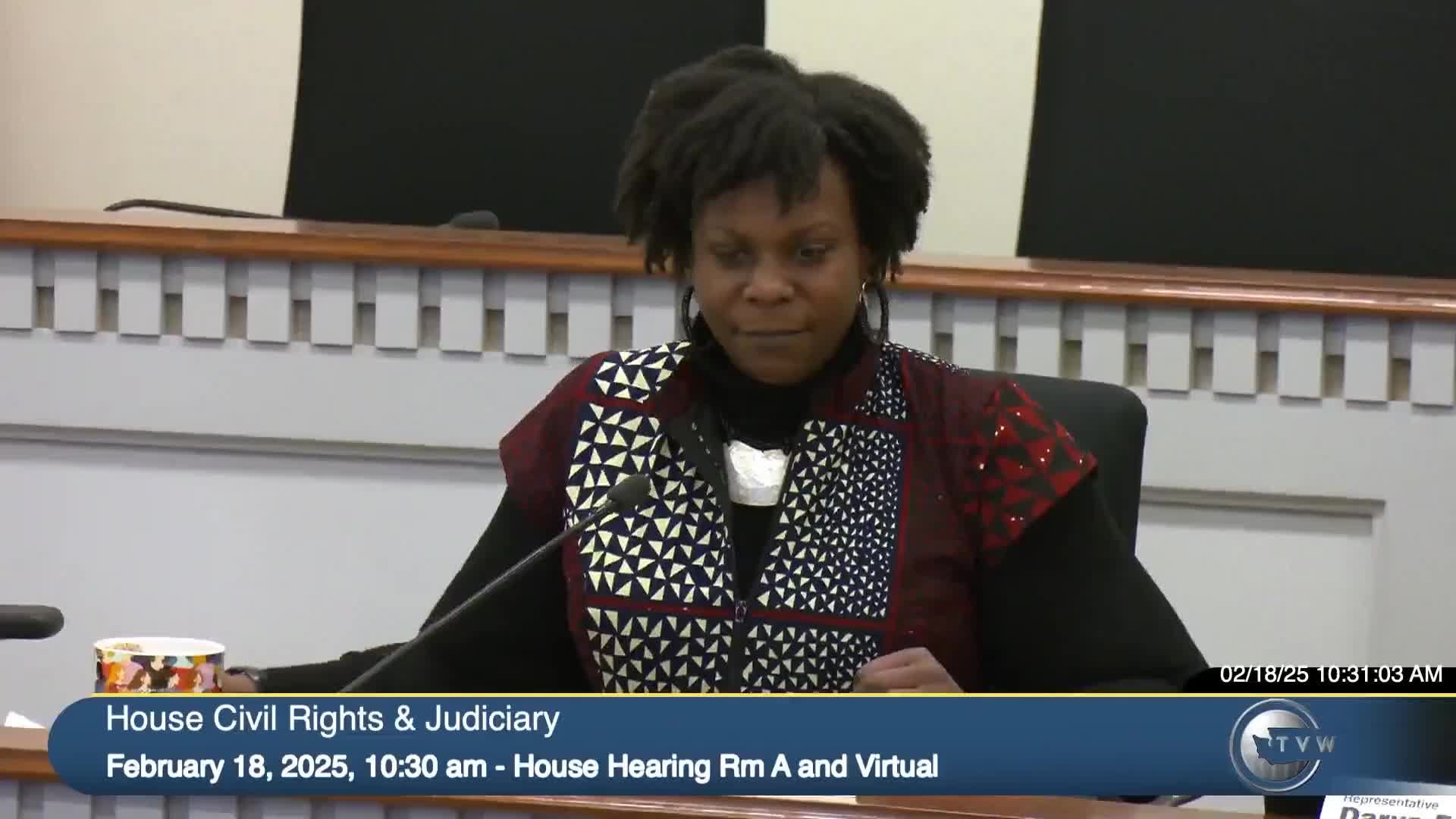Committee advances House Bill 1218 changing competency evaluation and restoration procedures

Summary
The Civil Rights & Judiciary Committee on Feb. 18 voted 8-5 to report a substitute for House Bill 1218 that revises competency evaluation and restoration procedures, adds duties for forensic navigators and delays certain growth-cap penalties to fiscal 2027.
The Civil Rights & Judiciary Committee on Feb. 18 reported out a proposed substitute for House Bill 1218 by an 8-5 roll call, recommending the bill for further consideration.
The substitute amends Washington’s competency evaluation and restoration system in several ways, including allowing a party (not only a court) to request a forensic navigator for a person charged with a class A felony, expanding forensic navigator duties, and adding provisions for coordinated transitions to case managers when a person is found not restoreable because of an intellectual or developmental disability, traumatic brain injury or dementia.
Why it matters: Committee leaders said the changes respond to a long-running court challenge and aim to reduce reliance on costly inpatient restoration while improving the system that determines whether defendants can be returned to competency to face charges. Vice Chair Farber said the bill was written “in response to the Trueblood lawsuit” and that Washington has reshaped its forensic behavioral-health system in the last decade.
Key changes in the substitute include a requirement that a hearing on whether to transfer a person from inpatient to outpatient restoration be held within 10 days rather than five, new alternative language for orders seeking involuntary medication that requires a court hearing within 10 days of receiving notice from DSHS, and authority to hold those hearings by video if statutory requirements are met. The substitute also delays the growth-cap penalty provisions until fiscal year 2027 and, in the second year that penalties apply, sets the county penalty at 150% of the rate for each third and subsequent referral over the baseline. The substitute specifies required elements for behavioral-health diversion plans.
Committee debate focused on effectiveness, cost and where responsibility should sit. Vice Chair Farber described the substitute as an effort to involve counties and reduce the state’s reliance on expensive restoration placements: “Over the years, we’ve spent $200,000,000 in just fines alone for not complying with the judge’s orders,” Farber said, and noted inpatient restoration is expensive. Representative Walsh urged a no vote, saying the proposal does not address root causes of why people are found incompetent and warned it shifts burdens to counties. Representative Graham, citing experience with Eastern State Hospital in his district, stressed the need for secure, specialized treatment for people who may be dangerous: “When we have individuals like this that are very dangerous, we need to have places where people are trained to be able to deal with these individuals, in the best and most humane possible way,” he said. The committee also heard the staff briefing that described the substitute provisions.
Vote and next steps: The motion to report the proposed substitute out of committee with a due-pass recommendation was made by Vice Chair Farber and was seconded (second not specified on the record). The roll call was Taylor (aye); Farber (aye); Walsh (nay); Abel (nay); Burnett (nay); Entenmann (aye); Goodman (aye); Graham (nay); Jacobson (nay); Peterson (aye); Salahuddin (aye); Tai (aye); Wallen (aye). Staff announced the tally as 8 ayes and 5 nays. Committee discussion noted that the diversion components will be addressed in a separate bill to the finance committee; the growth-cap and other restoration-related provisions remain in this substitute.
Budget and cost notes recorded in committee discussion include statements that inpatient restoration can cost roughly $1,600 per person per day at Western State Hospital and that Eastern State Hospital can be more expensive; the substitute does not change those cited per‑day costs but aims to shift some resources toward diversion and treatment. The substitute also creates or relies on a newly created appropriated fund to receive penalty amounts; staff said monies in that fund must be appropriated and may be used for programs or services aimed at keeping people with behavioral-health needs out of the criminal justice system or diverting them once they are involved in it.
The committee’s action reports the substitute with a due-pass recommendation; the bill will move to subsequent floor or committee consideration per regular legislative procedure.

